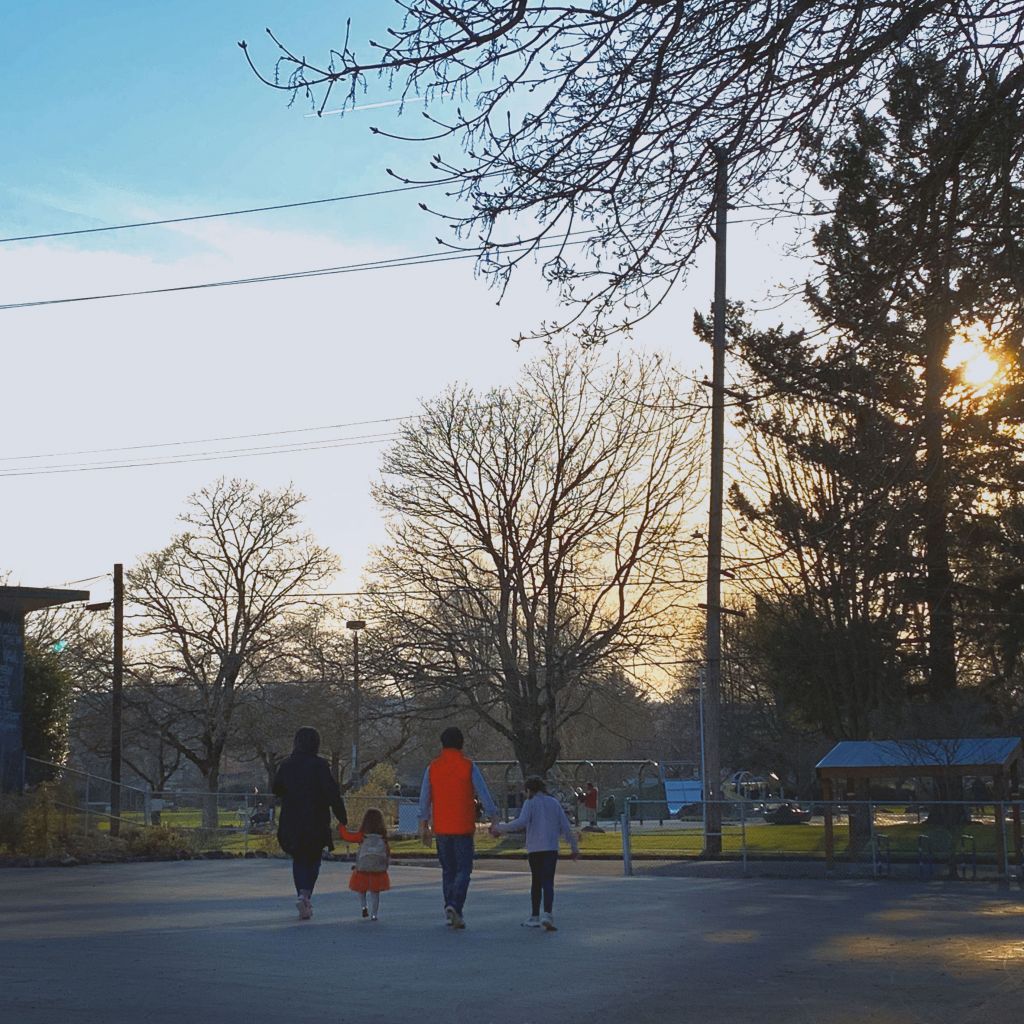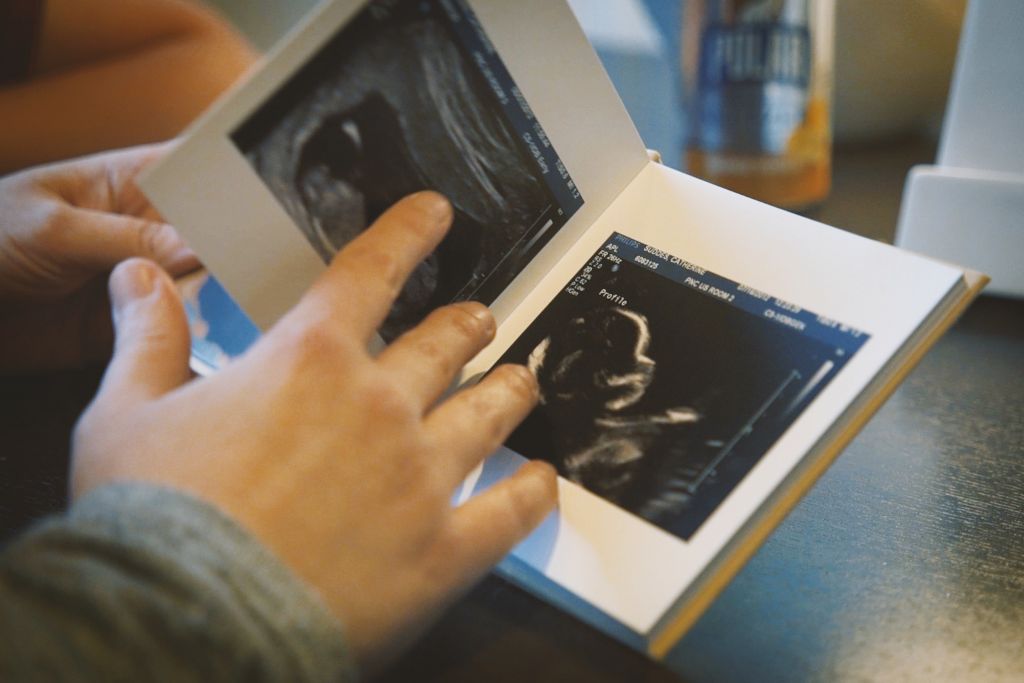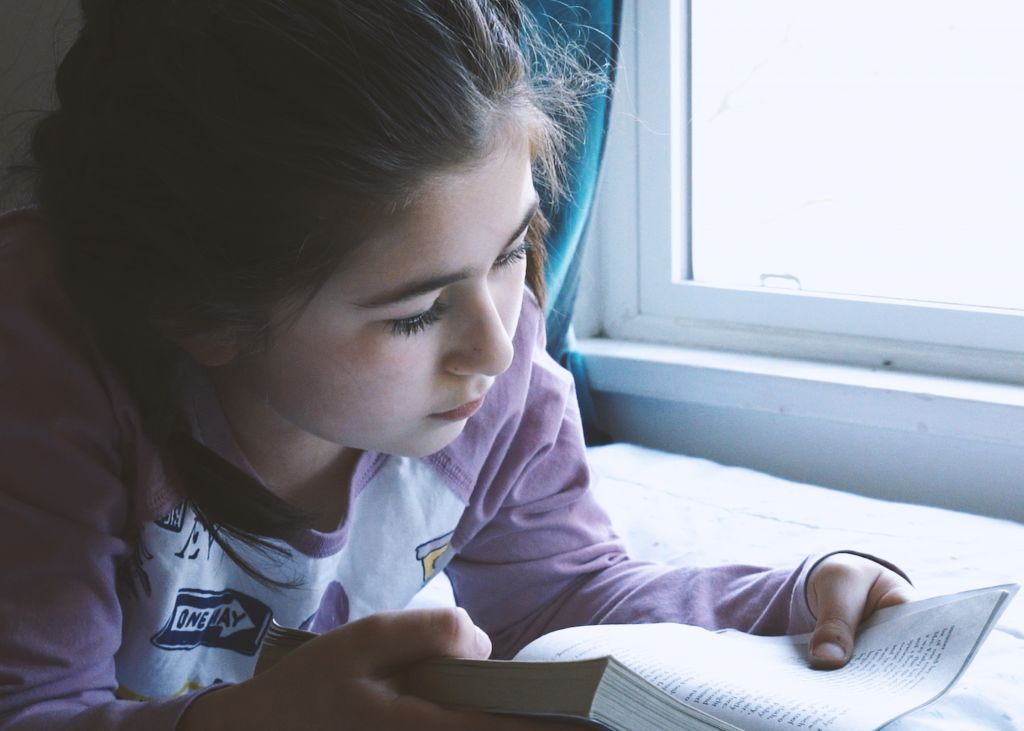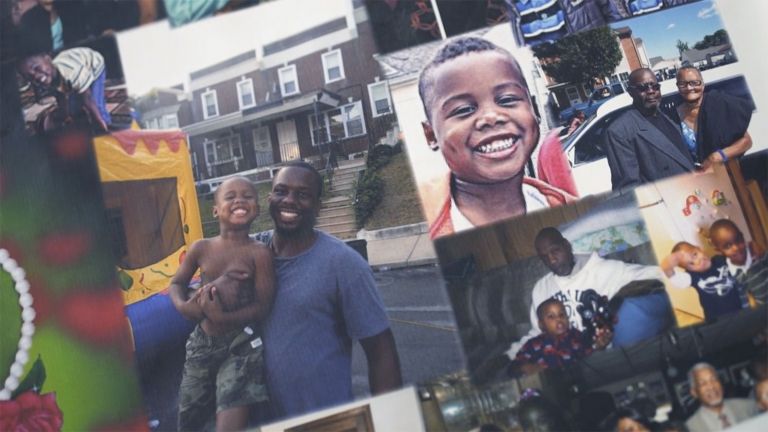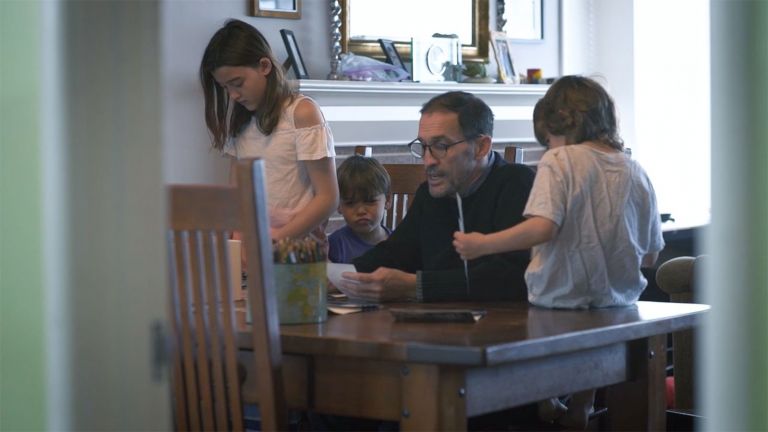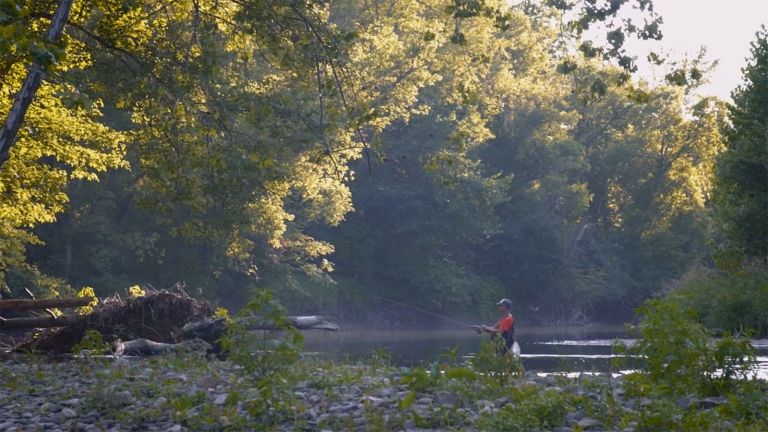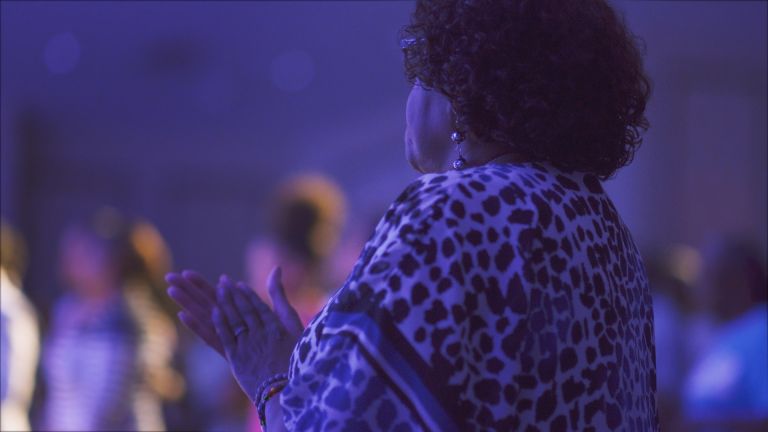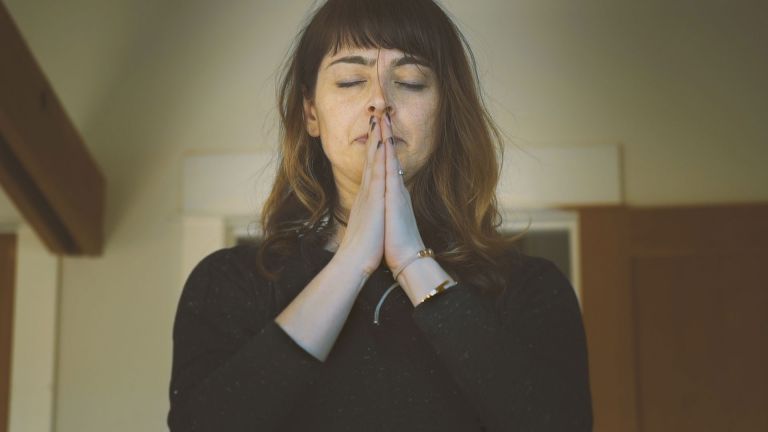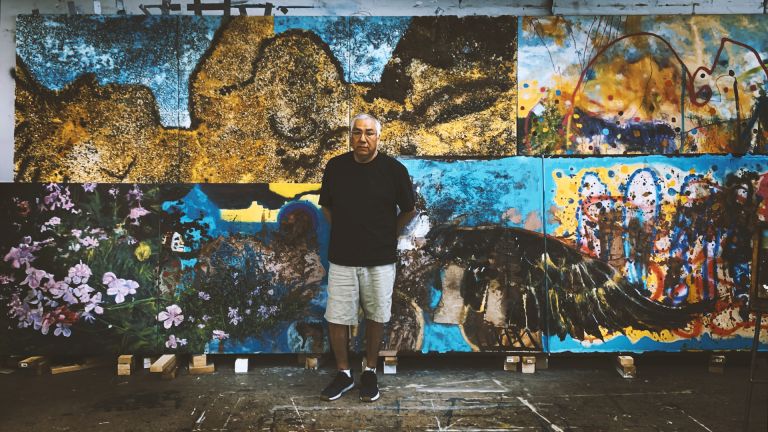Hilliard/Suddes Family
Kate and Jimmy’s son, Paul died on November 10 and was born on November 11, 2012. His sudden, unexplained death shocked their family. They struggled to balance their grief while also parenting their then-toddler, June. June reflects on the brother she didn’t get a chance to know and the impact the birth of her sister, Diana, had on her grief.
JIMMY: When the ultrasound came, and we saw that the heart beat was gone, I remember my first words to Kate were it’s not your fault.
KATE: After you find out that the baby has died, you’re kind of making these very surreal decisions side by side, which is making a birth plan, you know, in a plan for labor and delivery and then making a death plan. Paul drew this line in our life where everything is before him and after him. And I look back at pictures of myself, or think about certain experiences, and it’s like looking at, I can’t imagine not having the knowledge of his life and death.
JIMMY: My, my way of grieving comparing to Kate’s was very, very different. I would wake up at three in the morning and Kate would be gone from the bed. She’d either be walking or she’d be in the basement screaming. I didn’t do anything like that. My, my desire to kind of compartmentalize and control. I think in order to exert that amount of energy to do that made me very static. I think that I spent a lot of time. Um, just trying to find a way to survive. Trying to find a way to package it up. Put it away for another time.
JUNE: It was really sad we would never see him gain except for when he was born. I talk to my parents about what do you think he would be like and I think they were kind of sad too and let down.
KATE: She’s a pretty empathetic old soul. I think she was trying to process why her parents were so deeply sad.
JIMMY: I don’t know if I was the best parent all the time. To be in the middle of grief and to be forced to care for a toddler is definitely a weight. But, sometimes, it is a life preserver. There are times that I look at June and what she did for us and not knowing what she was doing. When it’s really nice out and you have a child who wants to go to the park and you don’t have it in you to be in the world, but she would just persist. She would just keep asking so we would go and then you get out there and you find out that you can exist in the world again.
It doesn’t go away, and those periods of time where you’re not thinking about him get longer. And kind of more far apart. And that can be jarring. You know, there’s times when I’ll think about him, and remember all over again what we went through. I also mourn the things that I’ve forgotten. You know, that’s a different kind of sadness, is like, we have 73 pictures of him. I know that. And I can’t believe we don’t have 200. You know, and there’s moments that I just don’t remember, that I blacked out of laboring with him, or after he was born. And so there’s a different kind of sadness in getting further away from it. And I think that’s something we don’t talk about enough either is, like, when you’re close to it, you still have all of those sense memories. And you know, the sounds, the sights, all those things. And then as you get further away, it, it is a different kind of sadness ’cause it’s just a distance. And you just lose, you lose those things.
JUNE: I felt excited ’cause with Paul, he would never come home. But with Diana, I thought that she would actually stay, and I had someone to play with. sometimes I would help her, um, like feed her. And sometimes when she took naps, I would read to her and then put her to bed.
INTERVIEWER: When you do things for Diana, does that ever make you think about Paul?
JUNE: Yeah, sometimes.
INTERVIEWER: What kind of things do you think about?
JUNE: Like books. Like wondering what kinds of books would he like if I did the same thing with him as I did with Diana. To like put him to sleep and stuff and feed ’em.
I remember it’s, it’s one of my clearest memories, like in the first couple of days, uh, sitting in that bathroom and pumping milk and just sitting on the edge of the tub and watching this milk run down the drain and thinking like, how did, how did I get here? And it was like three days ago I was pregnant and almost ready to bring home this baby and now it’s, you know, midnight and I’m sitting on the edge of my tub pumping to get rid of this milk and trying to suppress it.
The grief from my mom is different than the grief for Paul. It is definitely different. I, when I think about the grief for my mom, I think about the way that she was, she lived her last years of life and the sacrifices that she made for us immigrating here, coming to a country that she never knew, things that, there are things about her life near the end that I didn’t pay enough attention to that I, I wish that I had had an opportunity to go back and ask her questions or establish at least like an oral history.
The grief for Paul is, is the unknown. It’s not about missed opportunity or an inability to recognize the value and sacrifice a person has made for you. With Paul, it is, it’s all about the unknown. It’s about the family dynamic. It’s about what, I mean obviously about watching Paul grow up, but also watching how, our family would be different with a boy in it, it nothing but me and the cat. You know, it, it changes things. To have a middle child that was a boy, to see June be an older sister for him. To see Diana the youngest of three.
The grief is, it’s all about the unknown for me. How I would be as a father of a son. I mean, I don’t know what I would be like, how that would be different. When I see a lot of boys now having only girls now having June and Diana and I see boys around his age, I look at them like, wow, they’re different. They’re really different. Seeing them interact with the world. It, it would have been a blast to be father to a son.
And I remember being in the hospital and I had so much fear. . .I was scared of him. I was scared of what he was going to look like. I was scared of him looking like death. And he was like the most beautiful baby. I mean, we joke he’s, he was most beautiful baby of our three and he was perfect. He was perfect looking, and the second that I saw him all that fear because of how he looked, I just felt incredible guilt and shame.
We ended up going to couples therapy. Um, it, it just changes the landscape, like you, when you go through a still birth and then, you’re trying to manage your own grief, which is insurmountable and take care of a person who’s suffering from the same situation and you’re just, you have no bandwidth width for that, no bandwidth for that, then you don’t, you just don’t know what to do.
I don’t know how, I understand how we did it. I really I don’t. I don’t know how we knew how to navigate that. Checking in with each other, but not being able to do anything about it because you just couldn’t care for yourself and you couldn’t care for her. I couldn’t care for her because I wasn’t taking care of myself. And then to have a young child on top of that who is just dragging you back into daily life when you want to not move and not change your clothes and not, you don’t want to be alive, but you have a child who needs to be cared for. We have, you know, when I say that like that Kate and I were in the trenches, it’s, I think we do see it that way. Not to, you know, obviously not to minimize what being in a battlefield situation is like, but as I’m just a metaphor for trauma, a metaphor for tragedy. It’s dramatic how our relationship has changed and the challenges that have been put upon it because of this chapter in our relationship. It’s made us closer in a lot of regards. And then it’s made other things more difficult when you have a person like myself that, um, isn’t processing and it’s just keeping things in, not expressing, what does get expressed. It has to be deciphered because the root cause of that emotion or that action or that expression or that statement, it may not be what it appears to be. And from that regard, I think it’s made, it’s made it challenging.
When you’re pregnant and you’re sort of living your life, you have this community of people who are watching you get more pregnant every day. And my body became like this physical cue, right?
I had pretty distinct memories of the first few times when I did go out and just how exhausting it was. Um, and how taxing, you know, I think it’s one of the things that people we don’t talk about with grief a lot is just how exhausting it is physically, emotionally, psychologically. You know, I, our sleep was messed up. I mean everything.
And again, I was like postpartum, so it was like I was having to take care of my body and um, pumping milk and having to work on suppressing milk and bleeding. And I knew that when I started to venture out into public, it was going to be having to tell this story over and over. And so I couldn’t for a while. I literally didn’t leave the house.
It felt really important to me in the beginning to include him, um, especially because we were so close to this event of his birth. Um, and I felt a lot of guilt and sadness if I didn’t include him. You know, I felt like, it felt like, a huge betrayal to not say at that point that I had two children.
Um, it’s changed over the years I think a lot of times I, you know, I sort of quickly feel people out and if it feels like it’s not someone that I want to go into it with, I say, “Yeah, I have two girls,” you know, ’cause they can see them and count them. The thing that sort of triggers, Paul being talked about is people will often comment on their age difference and say... like, “Oh, five and a half years apart. That’s so nice. It’s so nice that you did that. It must be so great that your older daughter can help out and blah,” you know? And it’s like sometimes I just say, “Yeah, it’s nice.” And then other times I say, “Actually we had a son in between that we lost.” And then people kind of go, “Oh,” you know, ’cause you just, I mean, I think that’s another component of grief that, um, these common little seemingly gentle observations, you know, or neutral observations can often be loaded.
I mean, definite hard, challenging times in our relationship. I remember a period of time, like a year or two how where I would just lay awake at night and fantasize about like just leaving it all. Like, I’m just gonna pick up and leave June with him because she’s better off and leave the country, leave the state. Like, I’m gonna to start over and this can’t follow me. I’m gonna figure out a way where this intense sadness and grief doesn’t have to follow me because this is too hard.
And, you know, in the super like, self preservation moments, like what is the antidote to grief it’s love, right? So it’s like, I remember thinking, well there’s, there’s got to be like a surefire way against this. Like, I just, I have to not love people if I just don’t love anymore, you know, if I just, I don’t get attached. I don’t, I’ll never have to feel this again. And it doesn’t work that way.
As we meet people, you know, you meet people in your life and feels great. You think, “Wow, I could hang out with this person, right?” There’s a couple crossroads that you have to go pass through. It’s like, when do I decide? How is this relationship gonna go? Do I decide to share this with them? When do I tell them about this? ’Cause things are really looking good right now. And if I tell them this and share this aspect of myself to them and they blow it. I mean no pressure but, it’s real, you know. You think about it. You think about whether or not you’re gonna share this, whether or not you’re gonna tell a person that you suffered in this way or suffering in this way. ’Cause it’s risky sometimes. And that doesn't ever go away ’cause I’m always gonna be this person. I’m always gonna be a dad who lost a son. And I’m gonna keep meeting people and getting close to people and then, having to decide whether or not I tell them, whether or not I expose myself in this way. And then, having to just manage all the different scenarios that come from that, educate them, support them in their loss happens sometimes, or be supported which is a great outcome.
Grief has changed me in a way that’s made me very scared to feel it again. Um, I lost my mom just a little, a year before we lost Paul. And that was unexpected. She was ill or not feeling well. And then I get a call from my dad who’s in the ICU in Connecticut and they’re doing CPR on her and he’s asking me what to do.
And then a year later to experience the grief of a still born child, I feel that so much of my energy and my concern and my anxiety has been directed to trying to avoid this feeling again.
And I know that it has limited my life experience. It has colored my children’s life experience. It has wasted time and money in ways that I foolishly tried to make our lives more secure. It’s made me a more anxious person. And that is something that has never in my life have I felt more of a difference of who I am in grief and who I am outside of grief.
In my work. I don’t have any room for it. Despite the fact that I’m working in the place, the only place I ever saw him and held him, there’s no room for it there. And then to come out of it and come home. It’s how it’s the grief is manifesting itself now is just a lot of energy, a lot of anxiety directed towards not feeling this again.
June was three when Paul was born and the grief for her looked, it was not immediate and that really caught us off guard.
I think she was trying to process why her parents were so deeply sad. And you know, a three year old, it’s like she knew that the baby wasn’t in my tummy anymore. And I remember I couldn’t say the words the baby died. I just, I couldn’t bring myself to physically articulate that. And so I said to her, the baby, she met him at the hospital and then I said, but he’s going to stay here. I think I said like, because he’s sick. I don’t know why I, it’s this weird, I don’t know why, but I, I couldn’t do it initially.
And so when we got home and she was confused, you know, she kept saying like, “He’s in your tummy.” Right. And then she would say, “He’s in the hospital.” Right. When is he... ? There was a lot of like, when is he coming home?
And, um, we had gotten all his stuff ready, his clothes and his, you know, we had little toys that we had picked out for him. And so, I think for her it was initially confusion and then just, she’s a pretty empathetic old soul. And I think she just could see how much pain we were in.
And then the sorta delayed part for her was then when I got pregnant with our third child, our second daughter. Um, and when we brought her home, June had a really hard time, was having like a lot of panic, a lot of anxiety. She was, um, you know, we would like put her down and a little bassinet and she would run over and start crying and say she’s going to fall. You’re not watching her. There was a lot of fear, um, about the safety of the baby. And she was so fixated on her breath, breathing, all these things that are sort of amazing in retrospect. Like, there was just this very visceral gut level like, managing of this newborn and she wasn’t sleeping and just having these long crying fits and temper tantrums.
We ended up seeing a therapist and then a child psychologist because we were just sort of at our wit’s end. Like, she was just melting down and it was the psychologist who said to us like, this is PTSD.
He’s classified as a stillbirth. There were no complications and, um, it’s one of those things that they can’t really give you an answer about. The people in our family and our friends, I think they really wanted an answer. I think a lot of people were really sort of fixated on the why of it. Um, I, I didn’t feel that way. I don’t know that had I known a specific reason, if that would’ve changed my grief all that much.
There was up a couple minutes, like, like literally like one to two minutes, um, right after he was born where, you know, he came out and they put him on my chest and I remember, you know, looking down and I, I completely forgot.
It was like, I just went to this other place where I had just delivered my son. And I remember looking at him and thinking like, oh my God, he’s so beautiful. He’s so perfect.
And looking at his hands and looking at his feet and really completely viscerally forgetting that he was gone. And I, after that minute or two looked up and at the end of my bed, you know, my husband was next to me our midwife, our midwife, the hospital midwife and a few nurses and a student.
And I looked up, it’s actually kind of like this, it was like big spotlights in the hospital room and all these people, it was like this wall of people and they were all crying and that’s when I was like, oh, that’s right. You know, like it hit me all over again.
JIMMY: I think looking back, we both have a lot of regrets about the moments, how long we kept him, and, um, the decisions we made about letting him go. Letting them take him. You, I remember just really feeling you want to move on to the next thing, right? You’re desperate to feel something different. I was desperate to feel something different, and make sure Kate was okay, and...But the, I mean that, you only have that moment once. You know? I'm grateful that June was there to see him, meet him. Um, I’m grateful for the photos that we took. Um, but I do, I do regret not taking as much time to spend with him for Kate and for myself. To keep him until they had to take him away from us.
KATE: We were so wiped and just emotionally racked the thought of the thought of planning something like that and having to be out in public in that way and around so many people at that time was just unimaginable to us. I just, I couldn't imagine talking to people. I couldn’t imagine having to be out in public and getting dressed and looking presentable and especially because I was, As the years go by that we sort of developed more rituals around that than we necessarily did at the time. I definitely have regrets about some of the things we didn’t do around the time he was born. , almost everyone we had in that experience that we encountered was wonderful. I, I wish there had been a little bit more focus on the grief piece and the death piece. It just in the sort of gentle reminders that, um, you know, you have such a finite amount of time with your babies when they’re like that. And of course, you know, you, I went into this not knowing a whole lot about stillbirth or infant death. And it isn’t until after we lost him, I did all this reading and all this research and you know, everything I can get my hands on that you sort of then it’s like I wanted to go back in time and curate, re-curate the experience. I remember reading a story about a woman who brought her her baby’s body home for 24 hours. And, um, I just, I think my husband and I both felt like we didn’t know what was allowed, you know. I wish somebody had said, are you, are you sure you’re done in some way? Because I think I, I think I rushed it. I think I was scared. I think I was starting to see his body change, you know, and, and the death process sort of setting in. there’s a lot that I wish I had done
It was waiting for the autopsy to come back and being like excited about that. I mean it’s, it's all relative, right? So you get, you land in this new landscape where you’ve lost your child, you don’t know why, and then the markers that you anticipate become so different. Right?
So the idea of like getting a medical report about him being notified that we could go to the hospital to pick up his ashes. Like I remember every day like checking my email constantly. Like when are they going to tell me that his ashes are ready? And then being excited when that email came because it meant we could go get him.
And that whole period was just these emotions I never could have anticipated where I, I felt like the absence of his body and wanting it home and with us and waiting for that and staying up at night, just being so distraught about him being someplace else and not knowing where he was.
I think there’s a honeymoon period with grief for sure, where people are present and they’re supportive and they’re checking in on you. think, you know, one of the tricky things about losing a baby is people are grieving for you, but they don’t know this person. You know? And I think when you, when you lose someone who’s older, who has relationships, there’s a knowing in that, that people sort of know what they’re losing. And I think with Paul, it became clear to me pretty quickly like, you know, I had been pregnant with him and I had this really clear sense of who he was. . . So I felt like I knew this person and other people didn’t. And that’s a really hard gap to bridge I think it was a lot of disappointment. It was disappointment. I
When you come home, immediately after the delivery of a baby who died The house is a minefield Kate had taken the baby car seat out of the back of the car. And I didn’t realize it, and we went to go run an errand and came back, and I came back around and I noticed it was gone. And I just out loud in the street, just yelled, “Who took the car seat out?” You know, it’s only one other person that would do it. And it was Kate. She said, “I took it out; I’m sorry.” And I just started bawling in the driveway. You know? You start getting the catalogs, you get the Babies R Us coupons. Um, you have to put away things that you took out from storage as you got ready. And there’s a process that, that, of retracting that expec, expectation of closing up the things that you opened to receive that child. That must be part of the healing process. I don’t know if it is or not, but you have to go through it. I mean, I guess we could have left it out forever.
It was really hard to try and be a husband and a father of a dead child in that moment. Being surrounded by my colleagues, being at the place of my work. You know, it’s really difficult to try and extricate yourself from that professional role, and allow yourself to be also taken care of. And also to, to be the person who takes, who’s taking care of your, your spouse, your loved one. You know? And it was really difficult. It was really difficult to see her be just so destroyed, and also so strong at the same time.
Having a child live after having a child die was also challenging. It’s challenging in a couple of ways. Diana does not know what we went through, you know? June is forever affected by it. She was in the trenches, seeing us express emotion, watching us just scream in pain. We tried to protect her from it but it’s hard when that emotion has to come out. Diana is unaffected and it is a breath of fresh air. You know, you have to also educate this little person about who this, who Paul was and why we make a birthday cake for him. And he’s not here to blow out his candles. And we really try hard to continue to make space for him and be parents for him, even though he’s not here.
